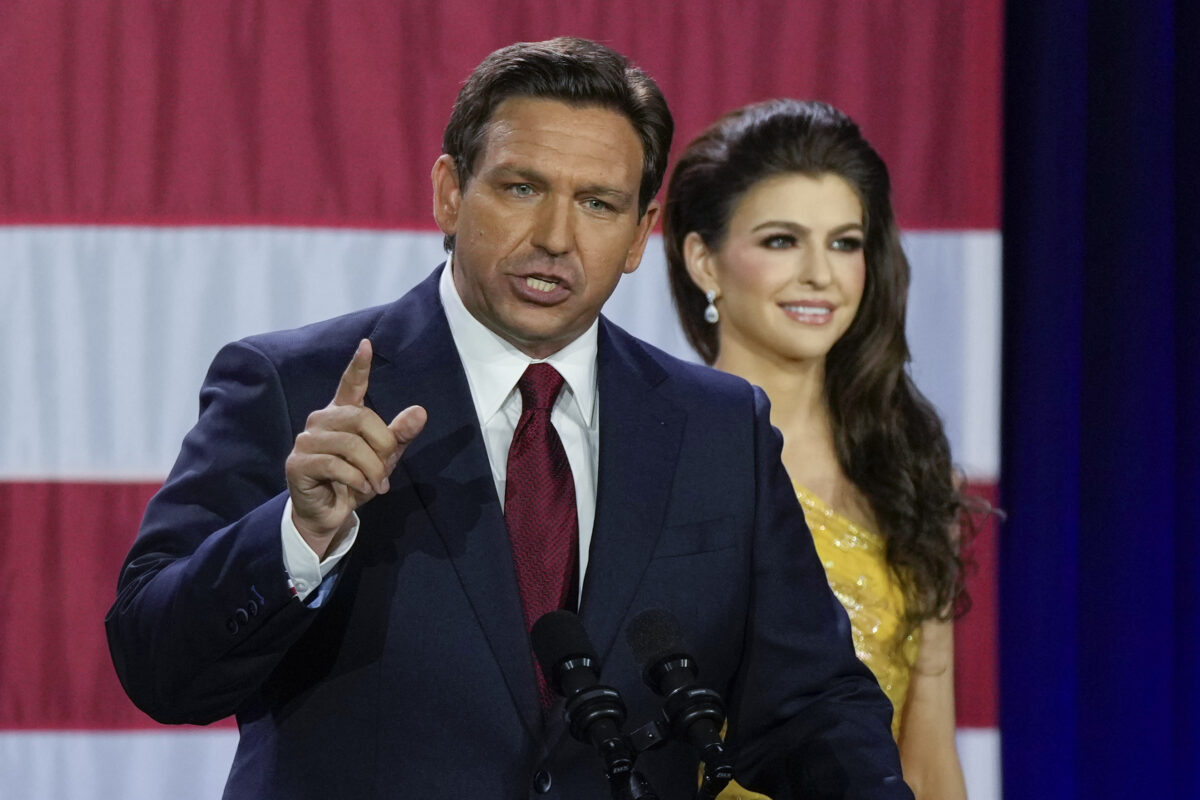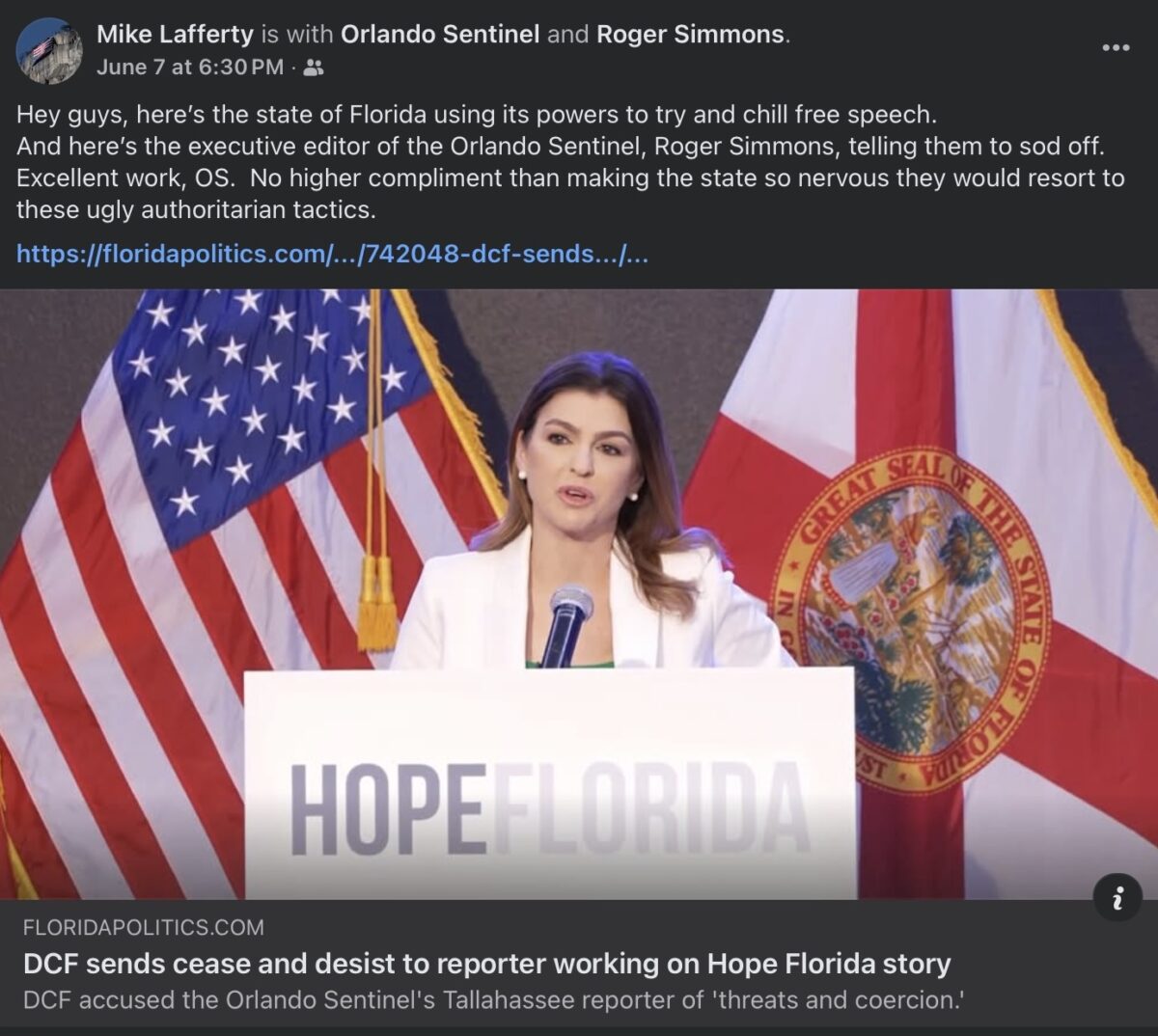Orlando Sentinel Defiantly Responds to DeSantis Admin’s ‘Attempt to Bully Our Newsroom’: ‘Happy to Report That It Has Failed’

AP Photo/Rebecca Blackwell
The Orlando Sentinel editorial board dug in their heels in response to a cease and desist letter sent by Gov. Ron DeSantis’ (R) administration about their reporting on the Hope Florida scandal, publishing an op-ed declaring they would not allow “[t]his attempt to bully our newsroom” to “impact our reporting.”
Hope Florida, a state-created charity program that ostensibly is supposed to be helping connect private nonprofits and faith-based organizations with individuals needing assistance, is viewed by many as having been founded to create a platform for Casey DeSantis to launch her own campaign to follow her term-limited husband as governor. The program has been at the center of a maelstrom of controversy that has even led to Republican legislative leaders to call for investigations and even accuse the DeSantises and Attorney General James Uthmeier — the governor’s former chief of staff — of possible criminal activity.
According to reporting by the Miami Herald and Tampa Bay Times, three years ago, Florida entered into a settlement agreement with Centene, the state’s largest Medicaid contractor, regarding accusations it had overbilled for medications. Centene was supposed to pay just over $67 million to compensate state and federal taxpayers for the overbilling, but in accordance with the agreement drafted by DeSantis administration attorneys, $10 million of that was diverted to Hope Florida. That $10 million was sent by Hope Florida to two other nonprofit organizations, and then forwarded to a political committee overseen by Uthmeier and used to purchase ads opposing the marijuana legalization constitutional amendment that was on the Florida ballot last November.
A criminal investigation was launched last month.
Also at issue is what, if anything, Hope Florida has truly accomplished. Touted as the First Lady’s signature achievement, both DeSantises have staunchly defended the organization and made boastful claims about the Floridians they say it has helped and taxpayer funds it has saved.
Some of those claims, however, have not held up to scrutiny. Sentinel Capital bureau reporter Jeffrey Schweers reported on May 19 that Hope Florida had touted various “success stories” in its promotional materials but “provided few specifics to support its claims of impact.” Schweers interviewed Celia Franjul, who was featured in the Hope Florida magazine and portrayed with a “softly-lit photo of two children hugging a woman” that was not actually a photo of her or her children. The reality of her story did not match up with Hope Florida’s claims:
Three years after she was referred to Hope Florida, Franjul, 42, appears to be no better off than she was.
She lives with her three youngest daughters in a double-wide mobile home in Branford, an economically depressed rural community of fewer than 1,000 people northwest of Gainesville. The only employed person in her household is her fiancé, who works at a collection agency.
Franjul is not working, and she and her children are still on Medicaid — the government-funded health insurance for the poor — just as they were three years ago.
Hope Florida provided “moral support,” she said, but not much tangible help as most of its work involves sending clients to other organizations. “Everything is referrals with them,” she said.
Another report by Schweers revealed that a woman who appeared in a social media video praising Hope Florida had received a $588 payment from the organization a few days before the video was posted.
On June 6, the Florida Department of Children and Families (DCF), an agency that reports to Gov. DeSantis, sent an unsigned cease and desist letter to the Sentinel, Schweers, and Sentinel executive editor Roger Simmons.
The letter read:
Re: CEASE AND DESIST
It has been reported to the State of Florida Department of Children and Families that Orlando Sentinel reporter Jeff Schweers has been contacting Florida foster families and both falsely and with malicious intent asserting that the families are implicated in fraudulent activity by accepting financial assistance from Hope Florida Foundation, Inc., a charitable Direct Support Organization affiliated with this Department. After hurricanes Helene and Milton, these foster families had home restoration work admirably gifted to them by the Hope Florida Foundation to restore their living conditions so that they could continue to care for their foster children in their homes. It is believed that Mr. Schweers’ threats and accusations were used as coercion to get the families to make negative statements about Hope Florida for his reporting, and/or to dissuade them from accepting future assistance.
Foster families are the backbone of Florida’s child welfare mission, taking into their home abused or neglected children and providing them a stable family setting with which to grow and thrive. Here, the two (that we know of) families contacted were aided by Hope Florida Foundation, Inc., in rebuilding their foster homes after a devastating storm to ensure their caregiving was uninterrupted. To harass and intentionally cause distress to foster families by threats and coercion
is abhorrent.Cease and desist the above-described intimidation of these families.
State of Florida, Department of Children and Families
The letter was not only unsigned, it “did not…cite any specific examples of Schweers doing anything beyond reporting on a potential story,” reported Florida Politics’ Gabrielle Russon.
“We stand by our stories and reject the state’s attempt to chill free speech and encroach on our First Amendment right to report on an important issue,” said executive editor Simmons in a statement. “The state’s characterization of our reporter’s conduct is completely false.”
DeSantis tweeted the DCF letter with a comment, “Bottom feeders gonna bottom feed,” drawing a retort from Schweers.
“Why not respond to my numerous public records requests?” he wrote.
State Sen. Carlos Guillermos Smith (D) slammed the letter as a “[p]retty desperate” attempt to get the press to stop reporting on the Hope Florida scandal. “It’s the First Amendment for a reason,” tweeted Schweers.
The Sentinel editorial board expanded on their defiant response to the governor in an op-ed headlined “Intimidation won’t make the Sentinel back down on Hope Florida story.”
“This attempt to bully our newsroom away from a story is clearly intended to be chilling, but it won’t impact our reporting,” the editorial board wrote, noting “Hope Florida has already had a lot of questions raised about its funding and grants not just by the Sentinel and other media in Florida but also by state lawmakers.”
The editorial board continued with an update on Schweers’ reporting and a rebuttal to the DeSantis administration’s “hostile” approach to the press and attempt to “shut down” its reporting on this story:
The Sentinel is looking into grants distributed by Hope Florida to organizations, families and individuals. Schweers has yet to finish his fact-gathering for this story. His reporting, however, is far enough along to raise some questions, but we don’t have all the answers yet. We’re still interviewing people and analyzing records so we can have a complete and fair story.
The letter on Friday accused him of trying to “harass and intentionally cause distress to foster families by threats and coercion” to get them to talk to him for the story. That’s not how journalism works.
Schweers is a reporter, and he is doing what all of our reporters do — he’s looking for facts. But at no point did Schweers attempt any of the deeds ascribed to him in the letter, and he certainly hasn’t harassed or threatened any of Florida’s foster families. And to our non-lawyer eyes, it seems the anonymous writer of the letter is wrapping those accusations in faux-legal jargon and veiled threats as an attempt to stop this particular story.
“This is a new low for the DeSantis administration, to go after the media without even seeing what they’re reporting,” said Barbara Petersen, an expert media attorney with the Florida Center for Governmental Accountability. “These people have lost their minds.”
“If the goal of DCF’s letter was to intimidate our reporter and stop our reporting, we are happy to report that it has failed on both accounts,” the editorial board declared. “We will publish Schweers’ story — whatever it may find — once it is completed.”
Mike Lafferty, the now-retired former opinion editor at the Sentinel, posted on his Facebook page that the state government was “using its powers to try and chill free speech” and cheered Simmons for “telling them to sod off.”

Screenshot via Facebook.
“Excellent work, OS,” Lafferty congratulated his former colleagues. “No higher compliment than making the state so nervous they would resort to these ugly authoritarian tactics.”





Comments
↓ Scroll down for comments ↓